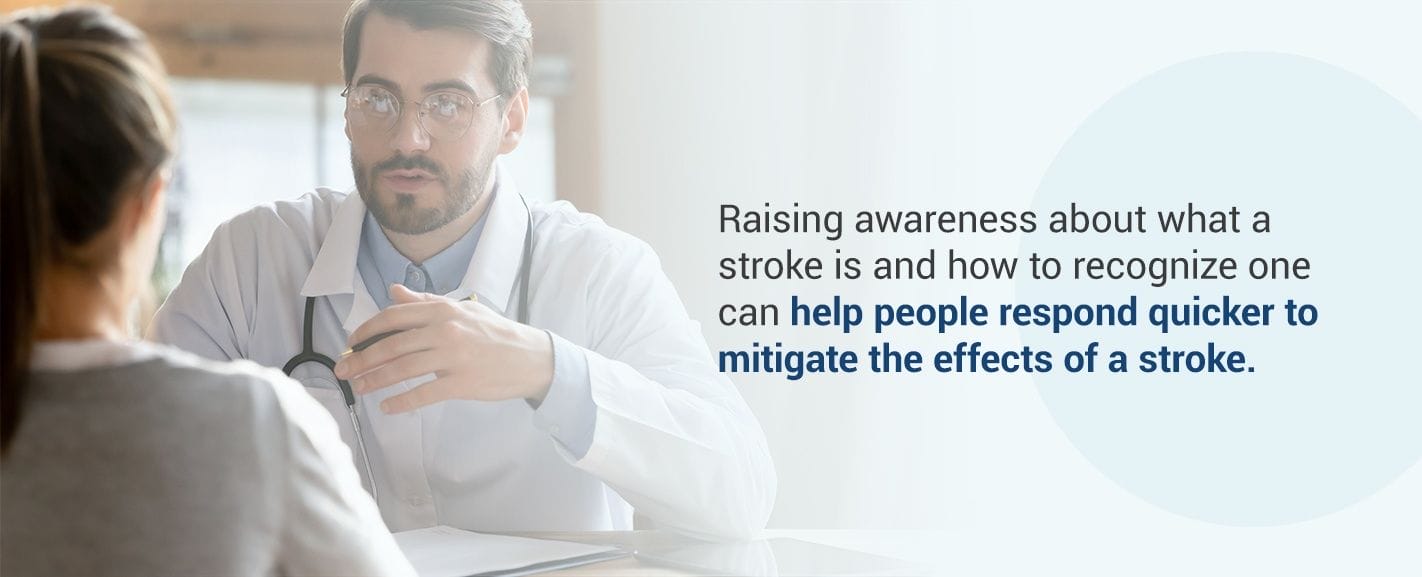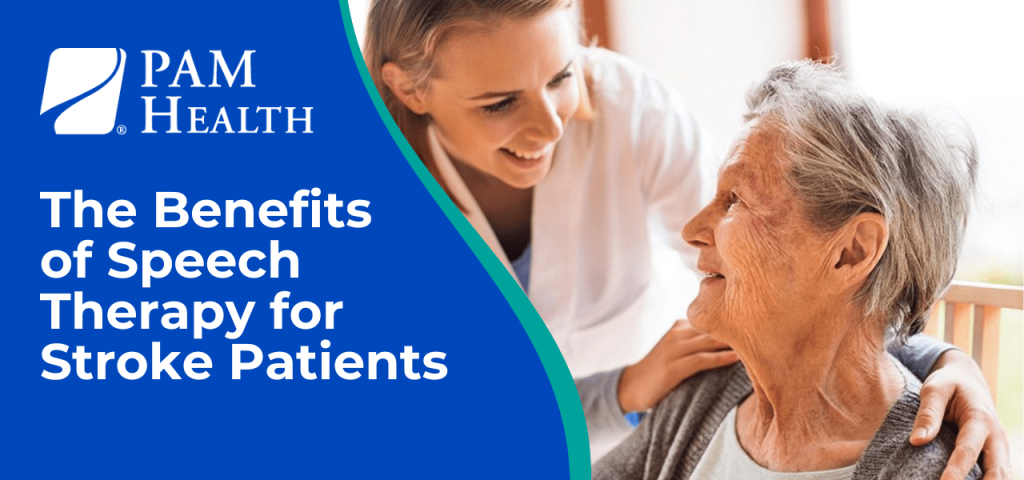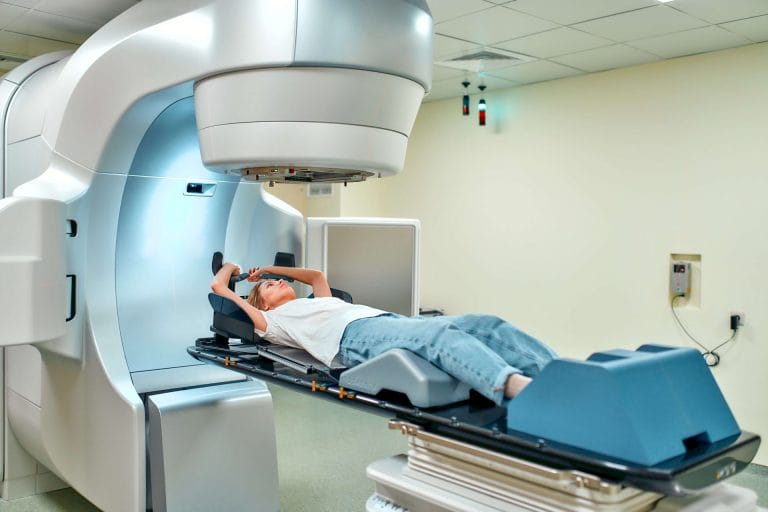A stroke can be so severe that it causes temporary or permanent paralysis and impairs memory and cognitive functioning. Part of what these side effects can impact the most is a stroke patient’s speech and communication capabilities. Although it can be scary to face everyday activities without the ability to express thoughts and emotions easily or understand others, there is a way for patients to recover speech after a stroke through speech therapy.
This article will cover everything about speech therapy for stroke patients including what a stroke is, how having a stroke can affect a patient’s speech and the speech therapy options available. If you have been wondering what a speech therapist does for stroke patients, keep reading to get some answers.
Find a Speech Therapist Near You

What Is a Stroke?
A stroke is a medical emergency in which the blood supply to part of the brain is seriously reduced or interrupted, cutting the brain tissue off from receiving oxygen and vital nutrients. Once cut off from oxygen and nutrients, brain cells can begin to die within minutes. To reduce brain damage and other negative side effects from a stroke, early action and prompt treatment are crucial.
There are two main types of strokes to know:
- Ischemic stroke: This type of stroke occurs when the blood flowing through the artery that delivers oxygen-rich blood to the brain gets blocked, causing severely reduced blood flow. During an ischemic stroke, blood vessels can become narrowed or blocked due to blood clots, fatty deposits built up in the blood vessels or other debris that has traveled through the bloodstream and become lodged in the brain’s blood vessels.
- Hemorrhagic stroke: When this type of stroke happens, an artery in the brain ruptures or leaks blood, which then floods the brain tissue. This leaked blood damages brain cells by placing an extreme amount of pressure on them. Within the hemorrhagic stroke category, there are two subtypes of strokes. An intracerebral hemorrhage is the result of a burst brain artery flooding the surrounding tissue with blood, and a subarachnoid hemorrhage refers to bleeding in the space between the brain and the thin tissues that cover the brain.
Along with an ischemic stroke and a hemorrhagic stroke, there is another stroke-like condition called a transient ischemic attack, commonly referred to as a mini-stroke. During a transient ischemic attack, blood flow to the brain is blocked for a fairly short amount of time, typically no longer than five minutes. Because blood flow is not blocked for an extended amount of time, the damage done to the brain by a transient ischemic attack is limited.
Although a stroke is a very serious medical event, it is not uncommon. In fact, someone in America suffers from a stroke every 40 seconds. Without proper medical attention and treatment, a stroke can be fatal or cause permanent damage to the body’s ability to function regularly.
Depending on how long the blood flow to the brain was impaired and which part of the brain was most affected, the long-term effects of a stroke may include temporary or permanent disabilities. Here are some of the most common post-stroke complications:
- Paralysis: A severe stroke may result in paralysis on one side of the body or loss of muscle movement in certain muscles.
- Pain: A stroke may cause pain, numbness or other unusual sensations like tingling in certain parts of the body.
- Memory loss: Stroke survivors may experience some memory loss or difficulty thinking clearly, understanding concepts, reasoning and making decisions.
- Emotional changes: After a stroke, it may be more difficult to control emotions. It is not unusual for a stroke survivor to develop depression.
- Difficulty speaking: A stroke can affect the muscles in the mouth and throat, making it a challenge to talk clearly, swallow or eat. These side effects can make speaking, understanding speech, reading or writing to be more difficult.
Raising awareness about what a stroke is and how to recognize one can help people respond quicker to mitigate the effects of a stroke. Whenever someone suddenly has difficulty speaking, a drooping face or arm weakness, it is imperative to seek medical assistance.
How Having a Stroke Can Affect Your Speech
A stroke can have a major impact on the survivor’s ability to communicate clearly, especially if the stroke affected the left hemisphere of the brain where the language center resides. The exact communication problems a stroke survivor has will depend on which part of the brain the stroke impacted and how large of an area was damaged.
The three main ways having a stroke can affect speech include aphasia, dysarthria and dyspraxia:

1. Aphasia
Aphasia is the most common language disorder a stroke causes. In general, aphasia can affect how someone speaks, their ability to understand what is being said as well as their reading or writing skills. Mild aphasia affects only one form of communication, such as speaking, while more severe aphasia can impact several modes of communication at once.
There are three subcategories of aphasia:
- Receptive aphasia: This type of aphasia involves problems understanding what is being said. With receptive aphasia, an individual may not be able to understand long, complex sentences and may be able to write but unable to read back what they have written.
- Expressive aphasia: Those with expressive aphasia have difficulty expressing what they want to say, might not be able to speak at all or may communicate with sounds instead of words. Those with less severe expressive aphasia may skip words while speaking, take long pauses while speaking or be unaware that what they just said was unrecognizable.
- Mixed aphasia: Also known as global aphasia, mixed aphasia is a combination of problems that can change most or all of a person’s communication skills. Those with mixed aphasia deal with components of both receptive and expressive aphasia.
Because having a stroke is the most common cause of aphasia, stroke-related aphasia is a well-researched topic. The effects of aphasia may be temporary or long-term, which means the proper treatment may alleviate the symptoms and clear up communication. Medical professionals have developed multiple approaches to reduce the effects of stroke-related aphasia.
2. Dysarthria
After a stroke, a person may suffer from dysarthria, which can inhibit communication by causing weakness in the muscles used to speak. Dysarthria can affect the muscles used to move the mouth, lips, tongue or the muscles that help regulate breathing while speaking. For these reasons, those with dysarthria may sound different or less clear than before.
Unlike aphasia, dysarthria does not affect the ability to understand others or find the right words to say.
3. Dyspraxia
Similar to dysarthria, dyspraxia affects the movement and coordination of muscles. While the muscles used to produce the voice may be fully functional in a patient with dyspraxia, they might not be able to move those muscles in the correct order or sequence to make the necessary sounds for consistently clear speech. In this way, dyspraxia makes correct pronunciation difficult.
How Speech Therapy Can Reduce the Effects of Stroke-Related Aphasia
The negative impact a stroke can have on one’s ability to communicate can be frustrating and distressing. Although aphasia does not affect intelligence, the way it presents itself can sometimes make people think it does. Fortunately, speech therapy can minimize the symptoms of stroke-related aphasia to make everyday activities like joining in conversations, reading and writing easier.
In speech therapy, speech-language pathologists assess, diagnose and treat disorders regarding speech, voice, language, cognitive-communication, the ability to swallow and other related issues. Through working with the patient and their caregiving team, a speech-language pathologist comes up with an individualized treatment plan tailored to the patient’s needs. This plan will be geared toward helping the patient achieve the highest level of communication and language function possible.
Part of the personalized care plan a speech-language pathologist creates may involve techniques for neuromuscular re-education of the voice and swallowing muscles, cognitive language exercises to restore or adapt language understanding and communication skills along with some activities to adjust communication ability.
Much of a speech-language pathologist’s work revolves around neuroplasticity — the brain’s natural ability to rewire itself. By activating neuroplasticity, the healthy areas of the brain get stimulated to take over the function of language. Because neuroplasticity is sparked by repetitive stimulation, working through various speech therapy exercises with a speech-language pathologist will encourage new areas of the brain to take on the functions of speech and communication.
If necessary, a speech-language pathologist may also provide medical speech pathology services and diagnostic studies to evaluate the capacity of the muscles used for swallowing, the vocal cords and functional voice. By increasing their awareness of any functional deficits within the patient, a speech-language pathologist can proactively address those issues and provide the most meaningful care possible.
What to Expect in Speech Therapy
Working alongside a professional speech-language pathologist is the best way to recover communication skills. There are some speech therapy exercises a speech-language pathologist may teach patients that can be easily done at home. When practicing speech therapy exercises on your own, they should always be done in front of a mirror to check form. The following are some exercises you may expect in speech therapy:
1. Tongue Side-To-Sides
For this speech therapy exercise, open your mouth and move your tongue over to the left side of your mouth until it touches the corner. Hold your tongue there for a count of two, then move it to the right corner of your mouth. Hold it there for another two seconds, and repeat.
2. Tongue Up-And-Downs
Open wide and stick your tongue out for this exercise. Reach your tongue up toward your nose and hold it as high as you can for two seconds before reaching your tongue down to your chin. Hold this position for another two seconds, then repeat the cycle.
3. Tongue In-And-Outs
Stick your tongue all the way out for two seconds before pulling it back in. After two more seconds, stick your tongue out and hold it there for two seconds again. Doing this move repeatedly will help train your tongue to move in coordinated patterns, as it will need to in order to produce clearer speech.
4. Smiling
A simple smile can help improve oral motor skills while boosting your mood. Stand in front of a mirror and smile, then relax. Repeat this exercise as much as you can to get your muscles in the habit of moving smoothly.
5. Kissy Face
For this exercise, first pucker your lips together, then relax them. Repeat this for as many reps as you can, slowing down the movement to challenge your muscle control even more.
6. Word Games
Word games are fun and great speech therapy exercises. By testing your language processing skills, word games can help you improve your level of communication. Playing brain games on a regular basis can help improve your speech by training your mind to think in different ways.
The type of word games you play will depend on which skills you need to work on most. To enhance your problem solving and visual processing, try word games like crossword puzzles or word searches. For sharpening your comprehension skills and visual processing, try your hand at computer games such as solitaire or alchemy.
7. Phonological Processing
The term “phonology” pertains to the pattern of speech sounds. This means that speech therapy exercises focused on phonological processing are intended to help patients better their ability to produce speech.
A popular phonological processing exercise you can practice at home with a loved one is guessing how many syllables are in a word. Ask your loved one to say different words and each time they say a new word, try to guess how many syllables the word contains. Your loved one will be able to tell you whether you are correct or not, which is the feedback that is key to making this exercise therapeutic.
Speech Therapy for Patients Who Cannot Talk Yet
For stroke patients who have sustained major damage to the brain’s language center, it may take some time to be able to talk again. However, speech therapy can still be highly beneficial for stroke patients who cannot speak yet. Although the patient will not be able to participate in most traditional speech therapy exercises, there are alternative voice therapy options.
Surprisingly, patients who cannot talk are most often able to sing their words. This phenomenon is due to speech being a left-brain function while singing is a right-brain function. Because of this, singing therapy is a highly effective strategy for helping stroke patients regain their ability to speak conversationally.
By training the undamaged right side of the brain to speak, singing therapy can make speaking a reality for stroke patients. With routine singing therapy sessions, there is hope for recovering the ability to speak, even for patients who have not spoken since their stroke occurred.
Contact PAM Health to Learn More About Speech Therapy for Stroke Patients
Working with a team of qualified speech-language pathologists and medical professionals can make all the difference when recovering from a stroke. At PAM Health, our staff is fully equipped to help stroke patients achieve an optimal quality of life through speech therapy and other treatment techniques. Our speech-language pathologists achieve long-term positive outcomes by prioritizing patient care and satisfaction.
Find a PAM Health Location Near You
To learn more about how the speech therapy services from PAM Health can help stroke patients communicate clearly again, find the facility nearest you and call today for more information.



